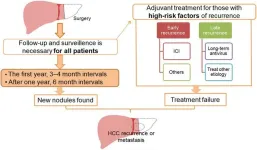(Press-News.org) Hormone modulating therapy (HMT) used for the treatment of breast cancer was associated with a 7% lower risk of developing Alzheimer’s disease and related dementias later in life, according to a new study published today in JAMA Network Open.
The study, which is one of the largest of its kind, found that although HMT was linked with protection against the development of dementia overall, the association decreased with age and varied by race.
“Our findings emphasize the importance of being cognizant of individual patient factors when we prescribe medications or develop treatment plans for breast cancer,” said senior author Francesmary Modugno, Ph.D. M.P.H., professor of obstetrics, gynecology and reproductive sciences at the University of Pittsburgh and member of Magee-Womens Research Institute and UPMC Hillman Cancer Center. “It’s not one-size-fits-all. We need to think about each individual patient to optimize outcomes and minimize risks.”
About two-thirds of breast cancer patients have tumors that are hormone receptor positive, meaning that they grow in response to estrogen or progesterone. For these patients, HMT can impede tumor growth by blocking hormones from attaching to these receptors. While use of HMT is linked with increased survival, there is conflicting evidence about whether it increases or decreases the risk of developing Alzheimer’s disease and related dementias (ADRD), debilitating conditions that are characterized by memory loss, changes in mood or behavior, and difficulties with thinking, problem-solving and reasoning.
To improve understanding about the risk of ADRD following HMT in breast cancer patients, Modugno, teamed up with lead author Chao Cai, Ph.D., assistant professor at the University of South Carolina College of Pharmacy. They used a federal database of people aged 65 and older to identify women who were diagnosed with breast cancer between 2007 and 2009 and who did not have a previous ADRD diagnosis or history of using HMT before their breast cancer diagnosis.
Of 18,808 patients who fit the criteria, 66% had received HMT within three years of their diagnosis and 34% had not. During an average of 12 years of follow-up, 24% of HMT users and 28% of non-HMT users developed ADRD.
To calculate the risk of developing ADRD, the researchers accounted for the risk of death associated with increased age and duration of exposure to HMT. They found that while HMT use was associated with an overall decrease in the relative risk of developing ADRD, the protective effect of HMT was most pronounced in patients aged 65 through 69 and diminished with age. Notably, when patients aged over 80, there was an increased risk of ADRD in HMT users.
“Our study suggests that younger women may benefit more from HMT in terms of reduced risk of developing Alzheimer’s disease and other types of dementia,” said Cai. “The benefits of HMT decreased for women aged 75 and older, particularly in those who identified as white. This suggests that the timing of HMT initiation is crucial and treatment plans should be tailored to a patient’s age.”
Black women aged 65 through 74 who used HMT had a 24% reduction in relative risk of developing ADRD, which dropped to 19% after age 75. White women aged 65 through 74 had an 11% reduction in risk of ADRD with HMT use, but this beneficial association disappeared after age 75.
“Black women have higher rates of breast cancer and tend to have higher lifetime stress due to structural racism and other societal factors, which are associated with worse outcomes,” said Modugno. “We don’t know the mechanisms behind the racial disparities we saw with HMT and risk of ADRD, but it’s possible that these factors could contribute. It deserves further investigation.”
“These findings emphasize the importance of being cognizant of individual patient factors when we prescribe medications or develop treatment plans for breast cancer,” Modugno said. “It’s not one-size-fits-all. We need to think about each individual patient to optimize outcomes and minimize risks.”
There are three main types of HMT: selective estrogen receptor modulators, aromatase inhibitors and selective estrogen receptor degraders. The analysis found that risk of developing ADRD varied by HMT type.
According to Cai, estrogen has neuroprotective effects, so these therapies could influence ADRD risk by mimicking estrogen, influencing estrogen production or modulating estrogen receptor levels. HMT might also affect clearance of a protein called beta-amyloid, stability of tau protein and vascular health, all of which are closely linked to brain health and ADRD risk.
“The relationship between HMT for breast cancer and dementia risk is complex and influenced by multiple factors,” explained Cai. “Ongoing research is needed to further understand the mechanisms behind this association and provide clearer guidance on the use of HMT.”
A limitation of the study was that it only included patients over 65. In the future, Cai and Modugno will include younger women who haven’t reached menopause yet to further understand the link between HMT and dementia risk.
Other authors on the study were Kaowao Strickland, M.P.H., Sophia Knudsen, Sarah Beth Tucker, and Chandana Sai Chidrala, M.S., all of the University of South Carolina.
This research was supported by the National Institutes of Health (5P30AG059294-04), the Carolina Center on Alzheimer's Disease and Minority Research and the University of Pittsburgh Dean’s Faculty Advancement Fund.
END
Hormone therapy for breast cancer linked with lower dementia risk
2024-07-16
ELSE PRESS RELEASES FROM THIS DATE:
Alzheimer disease and related dementia following hormone-modulating therapy in patients with breast cancer
2024-07-16
About The Study: In this retrospective cohort study, hormone therapy was associated with protection against Alzheimer disease and related dementias in women age 65 or older with newly diagnosed breast cancer; the decrease in risk was relatively greater for Black women and women under age 75, while the protective effect of hormone-modulating therapy (HMT) diminished with age and varied by race in women. When deciding to use HMT for breast cancer in women age 65 years or more, clinicians should consider age, self-identified race, and HMT type in treatment decisions.
Corresponding ...
AI tool successfully responds to patient questions in electronic health record
2024-07-16
As part of a nationwide trend, many more of NYU Langone Health’s patients during the pandemic started using electronic health record tools to ask their doctors questions, refill prescriptions, and review test results. Many patients’ digital inquiries arrived via a communications tool called In Basket, which is built into NYU Langone’s electronic health record (EHR) system, EPIC.
While physicians have always dedicated time to managing EHR messages, they saw a more than 30% annual increase in recent years in the number of messages received daily, according an article by ...
New analysis of Cassini data yields insights into Titan’s seas
2024-07-16
UNDER EMBARGO UNTIL JULY 16, 2024, AT 11:00 AM ET
ITHACA, N.Y. – A new study of radar experiment data from the Cassini-Huygens mission to Saturn has yielded fresh insights related to the makeup and activity of the liquid hydrocarbon seas near the north pole of Titan, the largest of Saturn’s 146 known moons.
The key takeaway: Using data from several bistatic radar experiments, a Cornell University-led research team was able to separately analyze and estimate the composition and roughness of Titan’s sea surfaces, something previous analyses of monostatic radar data were unable to achieve. This will help pave the way for future combined ...
New sleep study aims to understand cognitive decline in women
2024-07-16
LA JOLLA, CA—Alzheimer’s disease, the most common type of dementia, currently affects twice as many women as men, with minority populations predicted to witness the most significant increase in cases in the coming years, according to the Centers for Disease Control and Prevention.
Disturbances in sleep are well-known in dementia but have previously been explained as an outcome of the disease, not the cause. Increasing evidence, however, now implicates sleep disturbances with the development of dementia.
In a bid to better understand the relationship between sleep and cognitive outcomes in women, scientists at the Scripps ...
Turning agricultural trash to treasure
2024-07-16
In California's Northern San Joaquin Valley, agricultural leftovers such as almond shells, fruit peels, and orchard trimmings can potentially be converted into sustainable bioproducts and biofuels – with the right technology. Today, Schmidt Sciences’ Virtual Institute on Feedstocks of the Future awarded new funding to a group investigating how to make better use of the diverse agricultural waste in the region.
The group, “Building the Circular Bioeconomy in the North San Joaquin Valley” or BioCircular Valley, is co-led by the Department of Energy’s Lawrence Berkeley National Laboratory (Berkeley Lab), UC Berkeley, and BEAM Circular, ...
Adjuvant therapy for hepatocellular carcinoma after curative treatment: Several unanswered questions
2024-07-16
Hepatocellular carcinoma (HCC) is one of the most prevalent malignancies globally and is the third leading cause of cancer-related deaths. The primary curative treatments for HCC are liver transplantation, hepatectomy, and local ablation. However, the recurrence rate of HCC following hepatectomy or ablation remains alarmingly high, up to 70%, severely impacting patient prognosis and overall survival (OS). To mitigate postoperative recurrence and improve patient outcomes, various adjuvant therapies have been explored. Despite the efficacy of several adjuvant treatments in reducing recurrence rates and enhancing survival, ...
Palliative care is underutilized in nursing homes
2024-07-16
INDIANAPOLIS – Palliative care, specialized medical care focusing on providing relief from the symptoms -- including pain -- and the stress of serious illness, is underutilized in nursing homes, despite the large number of nursing home residents living with a serious illness such as cancer, dementia, Parkinson’s disease, heart failure or chronic obstructive pulmonary disease.
A qualitative study, published in the Journal of the American Geriatrics Society, analyzes lack of palliative ...
Understanding others: By age three, we can do this with mirror neurons
2024-07-16
Milan, July 15, 2024 – By the age of three, children are capable of understanding others, "mirroring" those they are with to imitate and anticipate their intentions. They are able to do it thanks to the sophisticated neurofunctional architecture that is necessary to understand others' intentions, the mirror neurons, that result already active at this age.
It’s the result of a study published in the prestigious journal PNAS, led by the collaboration between Giacomo Rizzolatti of the University of ...
Oil and natural gas development in Permian is a key source of ozone pollution in Carlsbad Caverns National Park
2024-07-16
EMBARGO: THIS CONTENT IS UNDER EMBARGO UNTIL 9 A.M. U.S. EASTERN STANDARD TIME ON JULY 16. INTERESTED MEDIA MAY RECIVE A PREVIEW COPY OF THE JOURNAL ARTICLE IN ADVANCE OF THAT DATE OR CONDUCT INTERVIEWS, BUT THE INFORMATION MAY NOT BE PUBLISHED, BROADCAST, OR POSTED ONLINE UNTIL AFTER THE RELEASE WINDOW.
New research shows that ozone concentrations at Carlsbad Caverns National Park frequently exceed Environmental Protection Agency health standards, likely due to oil and natural gas development in the Permian Basin and surrounding region.
The work was led through the Department of Atmospheric Science at Colorado State University and is part of ...
E. coli variant may cause antimicrobial resistance in dogs, humans
2024-07-16
ITHACA, N.Y. – Researchers studying antimicrobial-resistant E. coli – the leading cause of human death due to antimicrobial resistance worldwide – have identified a mechanism in dogs that may render multiple antibiotic classes ineffective.
The paper, which will publish July 16 in the journal Applied and Environmental Microbiology at 9:00am EST, opens up new avenues for therapies to treat both animals and humans – and establishes clinical infections in dogs as a surveillance approach for public health.
The research team analyzed more than 1,000 genomes of the resistant ...


